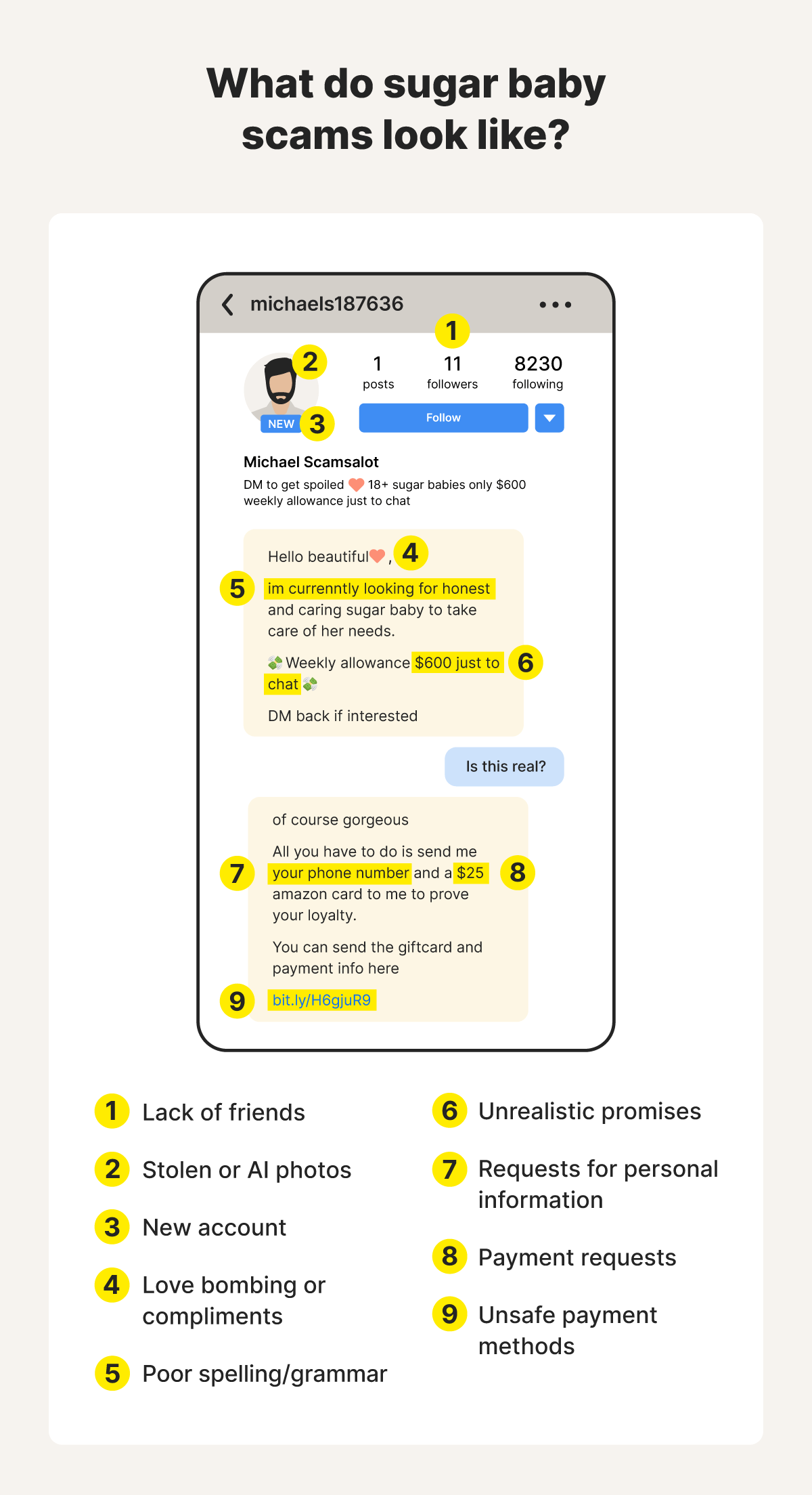How to spot sugar baby, sugar daddy, or sugar momma scams
Sugar relationships really do exist, but not everyone who says they want one should be trusted. Learn how to spot sugar baby, daddy, or momma scams and what you can do to help protect against them. Then, get a powerful online security app with built-in scam detection that uses advanced AI tools.

If you’ve been on social media for a while, chances are you’ve encountered a sugar dating scam at some point — or at least heard of them. They involve scammers pretending to be interested in a sugaring relationship, where they offer intimacy in exchange for money or vice versa.
While some sugar babies, daddies, or mommas are authentic and engage in a real and consensual sugaring relationship based on agreed terms, scammers prey on emotional vulnerabilities to steal money or personal information from victims before cutting contact.
Understanding what these scams look like, how they work, and what you can do to protect against them can help you avoid the fakes.
What are sugar baby, sugar daddy, and sugar momma scams?
Sugar baby, sugar daddy, and sugar momma scams are deceptive schemes that use promises of emotional connection or companionship to lower their victims' defenses. Sugaring scammers ultimately aim to steal money or personal information that they can use for identity theft or fraud.
The primary difference between these types of sugar scams is who they target. Sugar baby scammers aim to trick older victims by promising intimacy or companionship in exchange for money. Sugar daddy and sugar momma scammers target vulnerable young people by claiming they’ll provide money or gifts in exchange for companionship.
How do sugar baby scams work?
In a sugar baby scam, a fraudster poses as a young, attractive, and discreet companion, contacting potential victims to propose a sugar relationship. They’ll ask for money or try to extract sensitive information from their sugar daddy or sugar momma, but unlike a genuine sugar baby, they won’t follow through on their promises of companionship or intimacy.
Here’s a closer look at how sugar baby scams typically work:
- The scammer creates a fake online profile on a social media or online dating platform. They may use stolen photos and craft a compelling backstory to appeal to their target demographic.
- They identify potential victims on the platform, relying on profile information to look for vulnerabilities. Alternatively, they may take a more refined approach and selectively target wealthy individuals they identify via news reports, charity events, or professional networking websites.
- Once they know who to target, the sugar baby scammer will often reach out with a direct message, hoping to build trust and an emotional connection. This might involve showering the target with compliments, listening to their grievances, and fabricating stories about financial hardship.
- After building a foundational relationship, they propose a more serious sugar baby relationship or directly request money for "emergencies," "travel costs," or "self-care.”
- If the victim complies and sends money, the scammer will likely disappear, cutting all contact. If the target refuses to send money or becomes suspicious, they’ll move on to the next victim.
How do sugar daddy and sugar momma scams work?
In sugar daddy or sugar momma scams, a fraudster pretends to be a wealthy older person looking for a sugar baby. They’ll either contact a specific target or reach out to several simultaneously, and try to manipulate the unsuspecting victims into sending money or sharing sensitive information, often under the pretense of proving they’re real or “testing their loyalty” before establishing a full sugaring relationship.
Here’s a closer look at how sugar daddy or momma scams generally work:
- The scammer creates a fake online profile on a social media platform, dating app, or sugaring website, like Seeking or Sugarbook. They may prominently display wealth indicators — like pictures of expensive boats, clothing, or vacations — on their profile to sell the persona.
- They identify potential targets, focusing on young people who may be in college, in need of cash, projecting a desire for attention, or seeking a more lavish lifestyle.
- Once they have targets selected, the scammer will reach out using flattering language and feigning an emotional connection. To keep their target’s interest, they may promise to give an allowance, send gifts, and plan exciting vacations.
- If the victim buys into the ruse, the scammer may ask for money or personal information to “verify” that they’re real and committed to the sugar relationship. They might also request banking details under the guise of needing them to make payments, which they can later use to try to gain access to the victim’s financial accounts.
- Once they’ve got what they were looking for, the scammer will disappear, blocking communication and leaving the victim to deal with financial loss and emotional distress.
How to spot a fake sugar baby, daddy, or momma
The easiest way to determine if someone is lying about being a sugar baby, daddy, or momma is to investigate their profile, looking for signs of a scam like stolen photos or suspicious profile information. However, you may also spot red flags that indicate you’re being targeted in a sugaring scam in the language the perpetrator uses in their approach.
Here’s a full list of things to look out for when trying to determine if a sugar baby, daddy, or momma is fake:
- Stolen or AI photos: Scammers looking to attract victims often use catfishing techniques, tricking targets with stolen, deepfaked, or AI-generated images. Look out for profile pictures that look overly polished or cartoonish. To check if a profile picture has been stolen from elsewhere on the internet, perform a reverse image search.
- Lack of friends or followers: Accounts with very few friends or followers can be a telltale sign of a fake sugar daddy, sugar momma, or sugar baby. They may have set their profile up in a hurry, neglecting to make it look convincing.
- Purchased followers: Scammers might buy followers to appear more credible and popular. You can typically tell if followers are fake if they don’t engage with the potential scammer’s posts or have suspicious profiles lacking convincing personal details.
- Newly created account: A profile that looks very new, with a limited history of activity, is often a scam red flag. Scammers’ profiles may get blocked or deactivated if reported too many times, meaning they have to repeatedly create new accounts to continue their schemes.
- Payment requests: If a sugar daddy or momma asks you to send them a payment to prove your loyalty at any time, it’s likely a scam. Typically, a sugar baby will receive money, not send it.
- Unsafe money transfers: A sugar scammer might ask you to send money via an unconventional medium, like cash in the mail, wire transfer, cryptocurrency, gift cards, or payment apps like Venmo. These payment methods typically feature fewer reversal options, limiting the chance that you’ll be able to get your money back if you realize you’ve been scammed.
- Poor spelling or grammar: If a sugar daddy message pops up in your inbox and you have a hard time understanding it due to poor spelling or grammar, it might be from a scammer operating from another country.
- Requests for personal information: Sugar scammers may request personal information that they can use to hack your accounts or steal your identity. If your sugar interest ever asks you to provide them with sensitive details like your Social Security number or banking information, you’re probably dealing with a scam.
- Lovebombing: Love bombing is a manipulation tactic involving excessive displays of affection and attention to quickly establish control. Sugar scammers use it to create an intense emotional bond, making some targets more susceptible to their financial requests.
- Refusal to video call: Unwillingness from somebody claiming to be a sugar baby, daddy, or momma to get on a video call to prove they are who they say they are is a relatively strong indicator that they’re a scammer.
- Unrealistic promises: Sugar scammers may promise love, fantasies, exclusivity, loyalty, or money — whatever appeals most to their target. Be skeptical if these promises seem disproportionate to your current relationship level.


If someone seems too good to be true but you’re not sure if they’re a scammer, run their messages through a scam detector like Norton Genie to get an unbiased opinion. It’s free to use and available on mobiles and computers.
Where sugar baby, daddy, and momma scams happen
Sugaring scams frequently occur on social media platforms like Instagram, Facebook, and TikTok, as well as on dating apps and websites specifically designed for finding a sugar baby, daddy, or momma. Scammers exploit these online spaces by creating fake profiles and initiating contact with unsuspecting victims, often promising financial rewards or luxurious lifestyles.
Scammers might locate targets in public Facebook groups geared toward sugar dating, luxury lifestyles, or finances. They may also send random friend requests or take advantage of the Facebook Dating feature.
On Instagram, sugar scammers typically comment on their targets’ posts and follow up with a proposition in a private message. They may also find potential victims by searching hashtags related to wealth, travel, and luxury.
TikTok
TikTok’s young user base can attract sugar daddy and sugar momma scammers. One TikToker who received a message from a supposed sugar daddy was targeted with an overpayment scam, with the fraudster sending a fake check and asking for a fraction of it to be paid back. After the victim refused, the scammer, who had her name, email address, and phone number, threatened her life.
Discord
Sugar baby scammers may search for targets on Discord by joining servers where users with shared interests can chat, share content, and collaborate. While Discord servers are typically invite-only, scammers can find their way in through online forums like Reddit. After identifying a target and common ground, they may send a friend request, opening the door to manipulation and theft. This is why some users may consider Discord an unsafe platform.
Dating apps and websites
Online sugar dating apps and websites are hotbeds for these scams. Since users on these platforms are already seeking these types of arrangements, it’s easier for scammers to blend in. Fake profiles often mimic legitimate users, using similar language, setting the usual expectations, and mirroring the same allowance offers and requests.
Snapchat
Snapchat has a similarly young user base to TikTok, making it ideal for sugar daddy and momma scammers to exploit. They take advantage of private and disappearing messages to build relationships with targets. After receiving money or sensitive information, they vanish without a trace.
Scammers have targeted so many teens through this platform that local police departments have issued warnings. One ruse involves scammers building rapport with children, sending them good morning and goodnight messages, and giving them attention throughout the day. Eventually, they aim to gain access to and drain the children’s bank accounts.
How to avoid sugar daddy, sugar momma, and baby scams
Knowing where sugar scammers operate and what their approaches look like is important, but for the best defense against falling for a scam, it’s important to be proactive in your protection. Verify people’s identities, be wary of excessive flattery or urgent financial requests, and avoid sending money or personal information to anyone you haven't met in person or thoroughly vetted.
Here’s more detail on how you can help avoid falling for a sugar daddy, sugar momma, or sugar baby scam:
- Ignore unknown senders: One of the best ways to avoid online scams like sugar baby scams is to ignore unsolicited messages from unknown senders. This makes it more likely that they’ll move on to a new target, reducing your chances of being scammed.
- Block suspicious accounts: If a suspicious account ever messages you, blocking them immediately can help prevent them from drawing you into a scam.
- Avoid clicking on links: Many sugar daddy scams rely on you clicking a phishing link that leads to a malicious website designed to steal your information or compromise your device. Avoid clicking any links included in sugar daddy text messages to reduce the risk of identity theft or infecting your device with malware.
- Safeguard your personal information: No matter where you find yourself online, you should always safeguard your personal information to keep it from falling into the wrong hands. Avoid sharing sensitive personal details with any strangers online.
- Never send money to strangers: Even if someone claims they’ll reimburse you, never send money to anyone you don’t know over the internet. Not only could it lead to you losing your funds, but the scammer may also try to get information that lets them hijack your financial accounts and lock you out.
- Take your time: Whenever you’re contacted by an unknown account, take the time to investigate it and keep your eyes open for warning signs like missing profile information, fake images, or suspicious followers.
What to do if you fall for a sugar dating scam
If you fall for a sugar dating scam, you can help limit the risk of becoming a victim of serious financial fraud or identity theft by cutting off contact, collecting evidence, and filing reports with the relevant parties.
Here are the key steps to take if you fall for a fake sugar baby, sugar daddy, or sugar momma’s scheme:
- Cut off contact: Immediately stop communicating with the scammer to avoid further manipulation. Don’t confront them — this just allows them to spin a story that might convince you.
- Collect evidence: Gather screenshots of profiles, messages, and any financial transaction requests. This proof will be useful when you file a report with law enforcement or try to recover stolen funds.
- Contact your bank: If you sent a scammer money, ask your bank if they can stop or reverse the transaction. You can also ask them to freeze potentially compromised cards and turn notifications on for suspicious transactions so it’s easier to spot potential fraud in the following weeks.
- Protect against identity theft: If you shared sensitive information with a sugar scammer, you should immediately contact the credit bureaus to freeze your credit and consider locking your Social Security number to help prevent identity theft. Then, continue monitoring your credit report to catch signs of potential identity theft early on.
- File a report: Report sugaring scams to the platform where they occurred, law enforcement, and the Federal Trade Commission (FTC). They can investigate the fraudulent activity, potentially shut down scam accounts, pursue legal action, and may help you try to recover lost money.
Protect against sugaring scams
Fake sugar babies, daddies, and mommas can target you whether you’re looking for a sugar relationship or not. Help protect yourself against these scams by getting Norton 360 Deluxe for scam detection, privacy boosting, and device protection capabilities that can help you spot deepfakes and avoid scams so you can safeguard your finances and identity.
FAQs
How to tell if a sugar momma, daddy, or baby is real?
Signs that a sugar baby, daddy, or momma is real include them being willing to meet in person or by video call, sending you money with nothing expected in return, and being clear about their relationship aims.
Should I give a sugar daddy my phone number?
It’s best to avoid giving a sugar daddy your phone number unless you’re absolutely sure they’re not a scammer. Even then, providing your phone number can leave you vulnerable to harassment or stalking if things go wrong. Instead, opt to talk through secure messaging apps like Signal or Telegram. That way, you can more easily stop communication if the relationship turns sour.
What are safe payment methods for sugar babies?
There are no truly "safe" payment methods in sugar relationships due to the inherent risks of scams and exploitation. However, if you do exchange money, try to use a service like PayPal with buyer and seller protections or established escrow services. This helps create a record of transactions and could offer some recourse if fraud occurs, though it doesn't eliminate all risks.
Editorial note: Our articles provide educational information for you. Our offerings may not cover or protect against every type of crime, fraud, or threat we write about. Our goal is to increase awareness about Cyber Safety. Please review complete Terms during enrollment or setup. Remember that no one can prevent all identity theft or cybercrime, and that LifeLock does not monitor all transactions at all businesses. The Norton and LifeLock brands are part of Gen Digital Inc.
- What are sugar baby, sugar daddy, and sugar momma scams?
- How do sugar baby scams work?
- How do sugar daddy and sugar momma scams work?
- How to spot a fake sugar baby, daddy, or momma
- Where sugar baby, daddy, and momma scams happen
- How to avoid sugar daddy, sugar momma, and baby scams
- What to do if you fall for a sugar dating scam
- Protect against sugaring scams
- FAQs









Want more?
Follow us for all the latest news, tips, and updates.